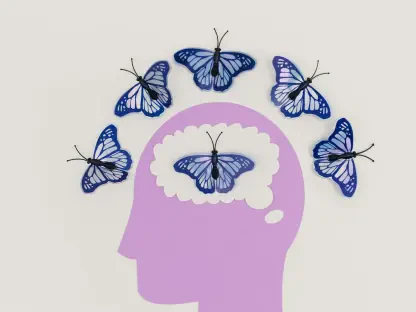Listen to the Article
Generation Z, born from 1990 to 2010, faces a rapidly changing world, full of uncertainty and significant challenges. They deal with global political issues, environmental worries, economic problems, and the huge effects of the COVID-19 pandemic. This generation has seen a lot of change. They are the first digital natives. But all the chaos affecting them often means their mental health is suffering too.
While there’s been plenty of discussion about the mental health struggles facing Gen Z, the specific impact these issues have on businesses, especially in the B2B space, hasn’t been explored enough. This article explains why Gen Z’s experiences with depression and anxiety are important for businesses and offers ideas on how companies can better support their younger employees and customers.
A Stark Reality: Gen Z and Mental Health
Recent research shows how deep mental health issues are affecting this generation. During a 2022 study by Harmony Healthcare IT, over 1,000 people aged 18 to 24 were interviewed. The results are just staggering. The survey revealed that 42 percent of Gen Z have been diagnosed with a mental health condition, anxiety and depression being the most common. Over a quarter got their diagnoses during the worst of the COVID-19 pandemic, which still affects mental health.
Other studies reveal the same reality. The American Psychological Association (APA) says Gen Z reports more mental health issues than older groups. A survey found that one in four Gen Z adults have more bad days than good in a month. Anxiety and depression are confirmed as the main mental health problems, hitting nearly 90 percent and 80 percent of those diagnosed.
These problems directly affect how younger employees perform at work. Issues like increased depression and anxiety can mean lower productivity, more days missed, and higher employee turnover, all of which disrupt a company’s day-to-day operations and long-term stability.
The Pandemic’s Lasting Impact
Clearly, the global COVID-19 pandemic is a major cause of this mental health crisis. For many members of Gen Z, the pandemic marked a defining moment in their lives, mainly because the lockdown and the subsequent changes in the schooling system caught them in the crucial stages of adolescence. When the world stopped, the pandemic changed how they interact socially, learn, and think about their careers.
The survey by Harmony Healthcare IT found that nearly 70 percent of Gen Z said the pandemic really hurt their mental health, making them feel lonely, isolated, and worried about what comes next. For many, social media has become a double-edged sword. It kept them connected, yet it also made them feel more insecure and anxious.
Perhaps most worrying is that 85 percent of Gen Z are feeling stressed about the future. Everything from the pandemic’s economic impact to climate change, political issues, and job market concerns feeds into Gen Z’s anxiety. They feel unready for grown-up life, with 75 percent thinking they’re worse off than older people. These feelings of not being enough and fear are not just affecting their thoughts—they are affecting their well-being.
The Economic Struggles of Gen Z
Money and the ability to spend it is a huge source of stress and anxiety for this generation. Gen Z’s financial situation is often fragile. Many enter adulthood with big student loans, really high house prices, and the hard task of finding good, stable jobs. Owning a house and being financially free is getting harder and harder for many Gen Zers, especially with rising prices and living costs. So, many of them feel hopeless about their future, exacerbating mental health struggles.
Furthermore, the economy doesn’t offer them the job security or important benefits they dream of. Many Gen Z workers have unstable, low-wage jobs that don’t provide financial security. This economic uncertainty is a big stress for a group already dealing with lots of problems.
To recruit and retain young talent, businesses need to get proactive about these issues. Competitive pay, steady jobs, helpful financial wellness programs, and easy access to mental health support can help ease their stress and make the workplace a healthier and happier place.
The Business Impact of Gen Z’s Mental Health Crisis
Mental health challenges among Gen Z employees directly affect how well businesses perform, especially in the B2B world where teamwork, consistency, and innovation are essential. Companies need to realize that ignoring mental health problems can harm team unity, creativity, and overall performance. For companies relying on strong collaboration, client relationships, and innovative thinking, taking care of their employees’ mental health is paramount.
Companies need to step up their mental health initiatives to better attract and support Gen Z employees. Making mental health conversations normal at work, providing easy access to mental health resources, and offering flexible work setups are key ways to help.
Using digital tools, like online therapy platforms and mental health apps, can also appeal to Gen Z because they’re comfortable with technology.
Businesses should also collaborate across industries to push for better mental health support and economic policies, creating a more stable and supportive work environment.
Conclusion
Generation Z is often referred to as the “depressed” generation, but this label oversimplifies the complexities of their challenges. Helping Gen Z with mental issues is key, as they face a changing world. Policymakers, schools, and companies need to see what these young people face and work together to provide the right solutions.
Gen Z is open to talking about mental health, which is good. But society needs to do more to give them the tools and opportunities. With enough support, this group might turn their struggles into strengths, changing how we see mental health.
Understanding and addressing Gen Z’s mental health crisis is essential for companies looking to achieve sustained growth, innovation, and strong business relationships. Mental health challenges among this generation aren’t just personal problems—they significantly impact businesses, requiring thoughtful and targeted actions.
By investing in their younger employees’ mental health, companies can build stronger, healthier, and more resilient teams, setting themselves up for success in a future defined by Gen Z’s unique strengths and experiences.









